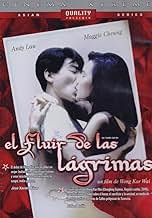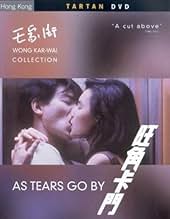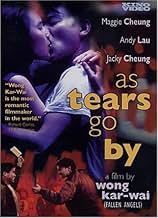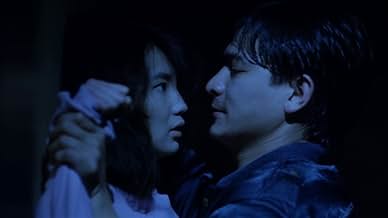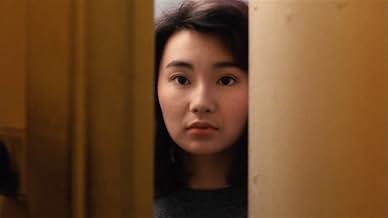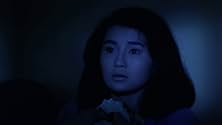VALUTAZIONE IMDb
7,0/10
13.466
LA TUA VALUTAZIONE
Il gangster di medio livello Wah si innamora della sua bellissima cugina, ma deve anche continuare a proteggere il suo volatile partner criminale e amico, Fly.Il gangster di medio livello Wah si innamora della sua bellissima cugina, ma deve anche continuare a proteggere il suo volatile partner criminale e amico, Fly.Il gangster di medio livello Wah si innamora della sua bellissima cugina, ma deve anche continuare a proteggere il suo volatile partner criminale e amico, Fly.
- Regia
- Sceneggiatura
- Star
- Premi
- 2 vittorie e 10 candidature totali
Recensioni in evidenza
Andy Lau is a hood who has no time for life, just brief respites. His last girl friend had her pregnancy terminated before even telling him about it, because he hadn't called in a while. "You could have called me!" he says, but three years with him have yielded her neither money nor marriage. So he gets drunk and comes home to his bare apartment where his distant cousin, Maggie Cheung is staying while doctors run tests to see if she is going to die. Then she turns out to be ok, and goes home, while he stays and deals with the gangs of Hong Kong, particularly his inept "little brother" Jacky Cheung, and the competing gangs, and the ugly messiness that is his life.
Then he shows up at Miss Cheung's. When he has to go back to Hong Kong to deal with Jacky's messes, she says nothing, but calls his phone service and leaves a message. "Come back safely."
Kar-Wai Wong's first feature as a director can be viewed as a gloss on Melville's LE SAMOURAI, but it is not an admiring one. Lau is all professional when dealing in the underworld, but outside of it he needs to be human, wants family and love, things barred to him by his trade. Melville's romantic impulses are based on violence, the thought of the smooth, dangerous man in a beautiful and clean world populated by elegant adults, like a shark swimming through the clean ocean. Wong's world is crowded and garish ad ugly, populated by psychopaths and would-be psychopaths. Wong's sense of beauty lies in the respites, in Miss Cheung's arms, in people who care. I find it far more believable.
Then he shows up at Miss Cheung's. When he has to go back to Hong Kong to deal with Jacky's messes, she says nothing, but calls his phone service and leaves a message. "Come back safely."
Kar-Wai Wong's first feature as a director can be viewed as a gloss on Melville's LE SAMOURAI, but it is not an admiring one. Lau is all professional when dealing in the underworld, but outside of it he needs to be human, wants family and love, things barred to him by his trade. Melville's romantic impulses are based on violence, the thought of the smooth, dangerous man in a beautiful and clean world populated by elegant adults, like a shark swimming through the clean ocean. Wong's world is crowded and garish ad ugly, populated by psychopaths and would-be psychopaths. Wong's sense of beauty lies in the respites, in Miss Cheung's arms, in people who care. I find it far more believable.
For me, Kar-Wai is one of the great contemporary directors. This is his first feature, and is rather a conventional Hong Kong gangster movie. However, it already has elements of the visual style and technical flourish that are utilised so well in his later more complex films. An average film with some nice touches, but certainly worth watching for Kar-Wai fans.
No better one day film school can be found in watching "Mean Streets" and then this.
Superficially they seem the same and Kar-Wai has told us that he patterned this, his first feature after Scorsese's first.
Here's the lesson: Scorsese belongs to a school of thinking where actors create characters, real extreme and powerful characters. These characters literally create the situations around them. The filmmaker's job is to attach the camera to the characters. Nearly all Italian and Italian-American filmmakers believe this. This is fine if you can live on espresso, but most of us in a film life need something to sustain us.
Kar-Wai in his later films is clearly in another camp. He literally starts with no script. He creates a cinematic tone. Into that tone is spun a place and his actors are expected to find their way within it. Only then do we see characters, and the camera is never, ever glued to personalities.
It is a world of difference, as different as people who can talk only about other people contrasted to those who can create another world in a conversation.
Sooner or later, all lucid watchers must make a choice about how big their film universe can be. This was Kar-Wai's beginning. It is hard to see unless you know his later stuff. But it is there, like the pollen in the air.
Ted's Evaluation -- 3 of 3: Worth watching.
Superficially they seem the same and Kar-Wai has told us that he patterned this, his first feature after Scorsese's first.
Here's the lesson: Scorsese belongs to a school of thinking where actors create characters, real extreme and powerful characters. These characters literally create the situations around them. The filmmaker's job is to attach the camera to the characters. Nearly all Italian and Italian-American filmmakers believe this. This is fine if you can live on espresso, but most of us in a film life need something to sustain us.
Kar-Wai in his later films is clearly in another camp. He literally starts with no script. He creates a cinematic tone. Into that tone is spun a place and his actors are expected to find their way within it. Only then do we see characters, and the camera is never, ever glued to personalities.
It is a world of difference, as different as people who can talk only about other people contrasted to those who can create another world in a conversation.
Sooner or later, all lucid watchers must make a choice about how big their film universe can be. This was Kar-Wai's beginning. It is hard to see unless you know his later stuff. But it is there, like the pollen in the air.
Ted's Evaluation -- 3 of 3: Worth watching.
When it comes to Gangster movies, only the romantic lens of Kar Wai Wong could result in a movie that features a couple captured in loving embrace on its DVD cover and a title befitting a melodramatic sob-fest as opposed to the blood-thirsty, violent display that it actually aspires to be. Awash with a heavy-handed eighties synth-rock soundtrack that does absolutely nothing for the film some twenty years onwards, As Tears Go By is the byproduct of a director being given the reigns for the very first time and quite naturally, not quite knowing how to implement the hundreds of ideas that he has brewing around in his brain. Indeed, while much of the script is very barebones material drawing heavily influences from Scorsese's Mean Streets amongst other higher-budget Hollywood features, it is Wong's frantic, almost schizophrenic pacing and storytelling that gives it a voice of its own. Sure, it's a voice that at this point in time is still very much in its infancy—awkward and stilted—yet you can nevertheless see where the director was going with this, his directorial debut.
Telling the story of two Triad "brothers" as they battle the passions of themselves and those around them, As Tears Go By is an interesting take on the already well-established gangster movie format. Inherent here are the typical staples; the partners at odds with each other, one a young hot-headed blood-thirsty shark looking to go places and his Big Brother, a cool, laid-back veteran with little to no ambition. Brought together, the two end up at odds with other gangsters and loan sharks who consistently threaten death upon both of them should they fail to make ends meet. This tangent which naturally plays out as nine tenths of Wong's story here, bounces back and forth between genuinely compelling action and frustratingly caricaturist drama that seems to repeat itself every twenty minutes. Indeed, if there is any fault to As Tears Go By at all, it exists in Wong's insistence in elaborate, almost inconsequential set-pieces that are fun to watch the first or second time, but wear thin after you realize not much else is happening.
On the other side of the pond however lies a romantic subplot that has given As Tears Go By and indeed Wong himself their names in the cinematic landscape. Centering around the older brother and his passionate affair with his distant cousin who comes to stay for a while, the love story here as it is displayed, is fine and one can understand how audiences may have been moved by its appearance here within an otherwise stoic and bloody display of testosterone, yet suffocated by so much of said action, nothing much is achieved from this deviation. The result is something more akin to a distraction than a truly compelling romance; indeed, while many claim the scene which adorns the DVD cover (which depicts the two in a passionate kiss inside a phone booth) to be representative of Wong's romanticist indulgences that would permeate much of his later career as a film-maker, its initial appearance here is tepid at best. Instead I point to the movie's closing sequence as its most affirming and memorable; it's not exactly a typical Wong depiction, yet it's startling, moving and even just a little bit romantic at the same time too.
In the end, while As Tears Go By stands as a significant and interesting insight into a director's early footsteps in directorial shoes, much of the feature stands as too half-baked in areas that matter most and overly heavy-handed in areas which only lead to grating and often confusing indulgences. Sure enough, the performances are fine and the movie itself exists as a fair enough take on an already done-to-death genre, yet burdened with a fairly straight-forward script that caters very little to Wong's subtler strengths as a director (which he would find a decade on), much of this debut is rendered a mere artifact of curiosity for those interested; those looking for a genuinely thrilling, or enjoyable movie however should stay clear—As Tears Go By certainly has its moments, but lacks the connective tissue to bind it all together.
Telling the story of two Triad "brothers" as they battle the passions of themselves and those around them, As Tears Go By is an interesting take on the already well-established gangster movie format. Inherent here are the typical staples; the partners at odds with each other, one a young hot-headed blood-thirsty shark looking to go places and his Big Brother, a cool, laid-back veteran with little to no ambition. Brought together, the two end up at odds with other gangsters and loan sharks who consistently threaten death upon both of them should they fail to make ends meet. This tangent which naturally plays out as nine tenths of Wong's story here, bounces back and forth between genuinely compelling action and frustratingly caricaturist drama that seems to repeat itself every twenty minutes. Indeed, if there is any fault to As Tears Go By at all, it exists in Wong's insistence in elaborate, almost inconsequential set-pieces that are fun to watch the first or second time, but wear thin after you realize not much else is happening.
On the other side of the pond however lies a romantic subplot that has given As Tears Go By and indeed Wong himself their names in the cinematic landscape. Centering around the older brother and his passionate affair with his distant cousin who comes to stay for a while, the love story here as it is displayed, is fine and one can understand how audiences may have been moved by its appearance here within an otherwise stoic and bloody display of testosterone, yet suffocated by so much of said action, nothing much is achieved from this deviation. The result is something more akin to a distraction than a truly compelling romance; indeed, while many claim the scene which adorns the DVD cover (which depicts the two in a passionate kiss inside a phone booth) to be representative of Wong's romanticist indulgences that would permeate much of his later career as a film-maker, its initial appearance here is tepid at best. Instead I point to the movie's closing sequence as its most affirming and memorable; it's not exactly a typical Wong depiction, yet it's startling, moving and even just a little bit romantic at the same time too.
In the end, while As Tears Go By stands as a significant and interesting insight into a director's early footsteps in directorial shoes, much of the feature stands as too half-baked in areas that matter most and overly heavy-handed in areas which only lead to grating and often confusing indulgences. Sure enough, the performances are fine and the movie itself exists as a fair enough take on an already done-to-death genre, yet burdened with a fairly straight-forward script that caters very little to Wong's subtler strengths as a director (which he would find a decade on), much of this debut is rendered a mere artifact of curiosity for those interested; those looking for a genuinely thrilling, or enjoyable movie however should stay clear—As Tears Go By certainly has its moments, but lacks the connective tissue to bind it all together.
Wong Kar-Wai's feature debut is essential viewing for anyone who's been beguiled by his more recent work, but it is really just a slightly more existential take on the standard HK gangster pic. It has more commercial considerations, less emotional complexity (or navel-gazing, if you side with Jackie Chan, who called him "the most boring film-maker on the planet")* than 'Fallen Angels' or 'In the mood for love', but there's much to admire in his idiosyncratic digressions from generic conventions. Maggie Cheung, surely one of HK's finest actresses, but so rarely allowed to prove it, is slightly wasted here. Her performance is pleasingly internal and understated, far-removed from the pseudo-comic mugging she made to enact in the Police Story movies which made her famous, but her character is really just the pining girlfriend, an iconic figure of a better future. I can fully accept Cheung as the embodiment of all that is feminine and comforting in the world, but her role is a slight disappointment given the screen-melting roles Wong handed to Brigitte Lin, Faye Wong, Karen Mok and Cheung herself in later films. And, by the way, this is very violent.
* Jackie Chan also said that Amy Yip was the ugliest woman in the world and that ladies shouldn't fight in movies.
* Jackie Chan also said that Amy Yip was the ugliest woman in the world and that ladies shouldn't fight in movies.
Lo sapevi?
- QuizFirst film directed by Wong Kar-Wai.
- BlooperWah's facial bruises shift tremendously near the final scene from the time he got on the bus to the time he met Fly.
- Versioni alternativeSome home-video releases have different endings, which differ from the original in tone, editing, and duration. There are two of these alternate endings: one which extends the original ending by 2-1/2 minutes, the other an additional 2 minute "happy" ending. Both alternate endings are included on Criterion's Blu-ray release of the film in 2 bonus tracks, and are available for streaming on the Criterion Channel.
- ConnessioniFeatured in Fandor: Borrowing Time with Wong Kar-wai (2018)
I più visti
Accedi per valutare e creare un elenco di titoli salvati per ottenere consigli personalizzati
Dettagli
- Data di uscita
- Paese di origine
- Lingua
- Celebre anche come
- Secure Door to Cornucopia
- Azienda produttrice
- Vedi altri crediti dell’azienda su IMDbPro
Botteghino
- Lordo Stati Uniti e Canada
- 9436 USD
- Fine settimana di apertura Stati Uniti e Canada
- 4279 USD
- 4 mag 2008
- Lordo in tutto il mondo
- 13.133 USD
Contribuisci a questa pagina
Suggerisci una modifica o aggiungi i contenuti mancanti

Divario superiore
What is the Canadian French language plot outline for As Tears Go By (1988)?
Rispondi

